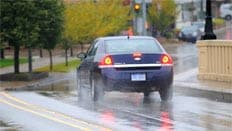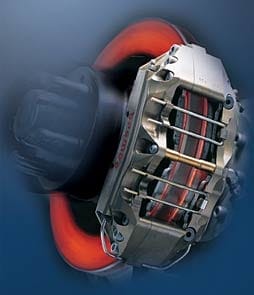How do you judge a vehicle's performance? Is it the ability to accelerate from 0-60 mph corner at over 1.0g or brake from 60-0 mph? Obviously while acceleration is exciting and cornering is fun...most of the time the ability to stop is most important! Performance isn't just about speed...it's about controlling speed. What happens when you step on the brake pedal has a lot of influence on how quickly your vehicle will stop...and may decide whether or not you still have a vehicle.
The front brakes do most of the work as the vehicle's weight pushes forward while stopping. Because of this, most vehicles are equipped with disc brakes on the front axle and drum brakes on the rear (sports cars and many sport coupes and sport sedans are equipped with disc brakes all the way around). A disc brake's superior overall performance is largely due to its ability to generate friction as the brake calipers force the pads to clamp against the rotors. The brake rotors are cleaned and dried by the brake pads dragging across them and the entire brake system is exposed to the air for excellent cooling. The advantages of rear drum brakes are typically in the areas of lower cost and their ability to easily integrate a mechanical emergency/parking brake system.
When it comes to evaluating brake performance, the friction that brake pads generate against the rotors, the brake pads' operating temperature range and their ability to resist fade are important. The brake pad material rubbing against the disc brake rotor generates the friction that slows the vehicle. A wide operating temperature range is important for driving enthusiasts so that brakes are effective when cold and resist fade when hot. Brake fade is when brake pads, brake rotors and/or brake fluid are heated so much that they lose some of their ability to slow the vehicle effectively.
Choices Beyond Stock
Stock disc brake pads are fine for the average driver. However, the driving enthusiast looking to enhance their car's brake performance has several other choices. Compared to stock brake pads, the performance brake pads developed by Hawk Performance for "road" and "sport" use (Hawk HPS) generate more friction and work in a broader range of temperatures while reducing the possibility of brake fade at higher temperatures. And if that's not enough, their high performance brake pads developed for "sport" and "track" use (Hawk HP Plus) continue to work in an even higher range of temperatures and further reduce the possibility of brake fade.
Additionally, performance disc brake pads aren't just for cars. Commercial fleet trucks and light trucks/SUVs carrying or towing heavy payloads can look at Hawk's SuperDuty brake pads.
When it comes to brake convenience and comfort, brake dust, noise and wear become the key items. As standard brake pads wear, brake dust is released as the friction material carbonizes at temperatures found in everyday braking. "Road" and "sport" brake pads are formulated to run cleaner because they resist carbonizing until over 1000° Fahrenheit, so in normal street driving, dust is significantly reduced.
Another popular addition to a high performance brake system are sport disc brake rotors that are dimpled, drilled or groovce brake fade by helping evacuate the surface film of gases that are often released during very heavy braking. All brake pads contain some organic (living) materials (like the petro-chemical resins that bind the friction materials together). As these organic materials "overheat," they revert to gases that may cause the brake pads to lose some of their contact with the rotor, essentially "hydroplaning" away from the rotor on a film of gases.
Note: Sport disc brake rotors will produce some additional noise. It's not uncommon to hear a whirring noise as the brake pads rub over the dimples, drill holes and grooves while driving. While some noise will remain, its level will become less noticeable as the rotors and pads break in.
Brakes are a Safety Critical Part of a Motor Vehicle
Brake pads and brake rotors are wear items and as such, should be inspected regularly and replaced as necessary. Brake pads should be replaced when approximately 1/8" to 3/16"" of friction material remains on the steel backing plate. Brake rotors should be replaced when their "Worn Rotor Minimum Thickness" (expressed in millimeters) has reached the prescribed limit engraved on the edge of the brake disc.
Brake pads and brake rotors should be installed by a competent mechanic in a professional manner. Any incorrect installation of brake components can cause a major safety problem or an accident. If you are not a competent and qualified mechanic you should not attempt to install these products, but should take the vehicle to a vehicle dealer or competent automotive mechanic for their installation.
Drivers who participate in track days with "road" and "sport" use brake pads should always take spare pads to the track and may find it desirable to also carry a full vehicle set of "sport" and "track" use pads in case they need to upgrade their brakes to provide longer pad life at the track or accommodate higher brake temperatures.
Important Reminder: Slotted, drilled or dimpled rotors offered as OEM replacements should not be considered appropriate for high-speed track use.
While grooved, drilled and slotted rotors offer an enhanced appearance and add some resistance to the boundary layer of gasses that can build up between the pad and rotor, they are not designed to withstand the extreme temperatures that are produced on the racetrack. If they are used on the track, it is very important that the rotors be carefully inspected and should not be driven on if even minor signs of deterioration are seen. Note, too, that if these products are used on the track they are not warrantable.
Was this post helpful?
415 of 719 people found this post helpful



